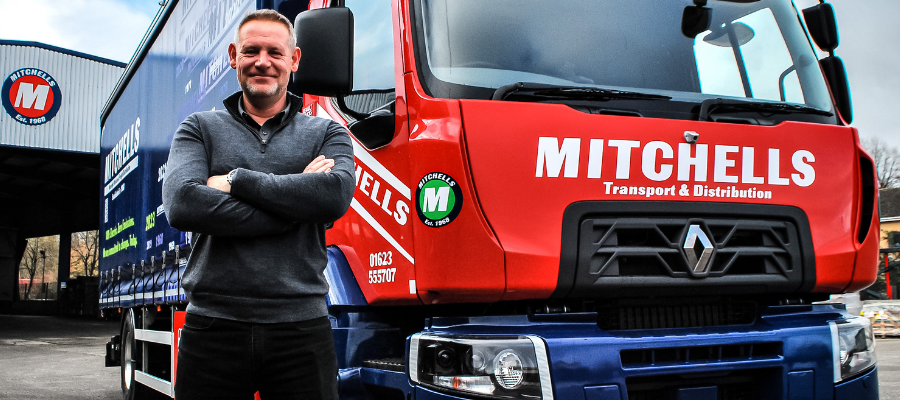🕒 Article read time: 2 minutes
Plan for your fleet of tomorrow, today
By Beverley Wise, Webfleet Regional Director for Bridgestone Mobility Solutions
Content sponsored by Webfleet

When Mitchells of Mansfield set its stall out to become an early adopter of electric trucks, their higher purchase price meant the company needed to be completely confident in their suitability.
With Webfleet and premium partner FMC Fleettrak, the Nottinghamshire-based pallet distributor was able to establish a proven business case to switch to the UK’s first electric Renault truck – the 18-tonne E Tech D Wide. By reviewing the mileage, tail lift usage and average speeds of its original diesel truck, it could anticipate its exact energy needs.
Richard Montgomery, managing director, told us that although the truck was more expensive than a diesel equivalent, with an eight-year-old daughter’s future to consider, there was no ‘plan B’.
“We don’t need greenwashing, we need real action to reduce our carbon emissions,” he said.
“The transport sector currently accounts for 24% of UK greenhouse gas emissions so the time to act is now – not tomorrow.”
This assertion should be seen as a call to action to fleets in the wake of Rishi Sunak’s decision to delay the ban on the sale of new petrol and diesel cars and vans.
The e-mobility revolution must continue apace.
A springboard to sustainability success
With the electric transition representing a significant change management undertaking, for some businesses the delay may be seized upon to take stock and to lay the groundwork for success.
It may afford them a little more time to introduce software solutions that will support them in making the transition, to select EVs that match their operational requirements, to refine their electric fleet policies and to fully evaluate their charging options and strategies.
Failing to prepare can, after all, mean preparing to fail. But this is not something that Mitchells, which is committed to becoming 100% carbon neutral by 2027, was ever going to fall foul of.
Insights from dedicated EV management solutions can help support decision-making at every stage of the electrification journey, and prudent planning saw the company also turn to Webfleet to help it meet its charging needs.
Rather than investing in an expensive proprietary charge point, the company has run a three-phase electrical cable out to a charging post at its Mansfield depot.
“It works faultlessly,” said Richard. “We get an email alert via Webfleet whenever the truck is plugged in, when it has reached capacity and if there are any interruptions with the charger.”
Sustained efficiency
There is not only a clear environmental motivator to decarbonise, but also a powerful business case. Decarbonisation can deliver long-term cost saving benefits across areas such as fuel, service, maintenance and repair.
Once the EV transition has been made, connected fleet management solutions can help ensure these goals are realised by continuing to optimise operations.
Battery levels and remaining driving ranges can be monitored in real time, along with charging statuses and remaining charging times. Vehicles’ energy performance can be compared and the kinetic energy recovered through regenerative braking analysed to help identify inefficiencies.
Furthermore, EV routing can also be optimised, taking account of vehicle battery levels, capacity, energy consumption and charge point locations.
By harnessing the power of such solutions, businesses can ensure that their fleets are fit for the future.
Published On: 16/11/2023 16:00:00

Comments Section
If you are a Logistics UK member login to add comments.